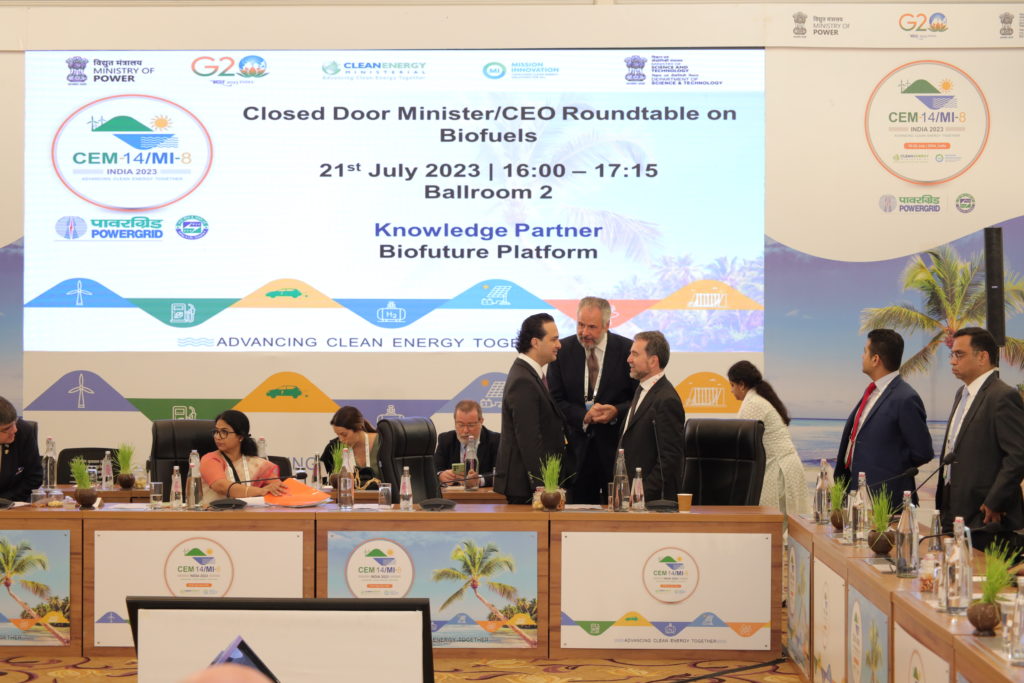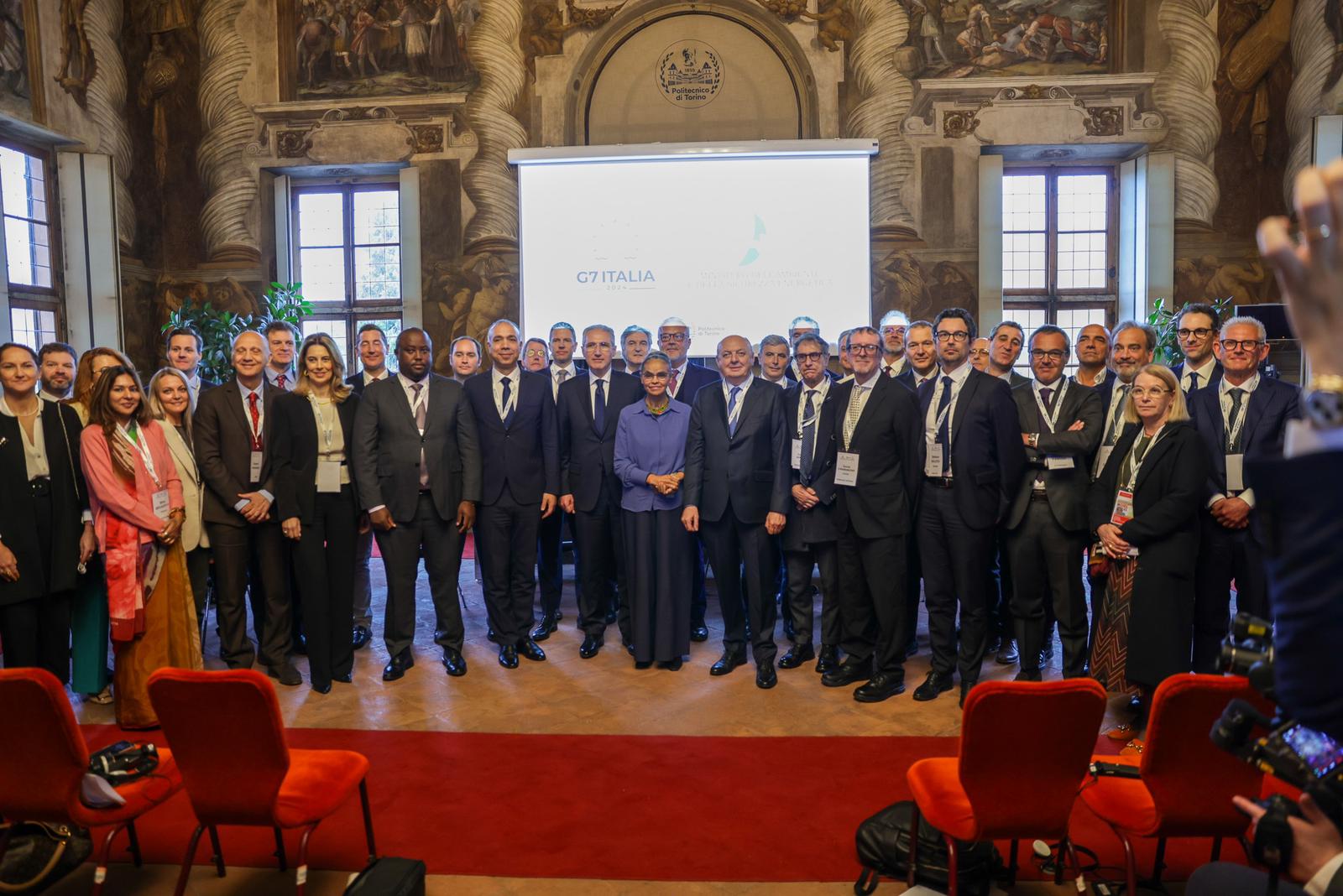The CEM14/MI-8 closed door Minister – CEO Roundtable on Biofuels was held on 21st July. The Roundtable was organized by the CEM Biofuture Platform Initiative and the Co-leads of the MI Integrated Biorefineries (India and Netherlands). The governments of Brazil, India, Italy, Korea, and the Netherlands were represented by their head of delegation or a senior official. 18 panellists from national technical agencies, international organizations, and industry leaders showcased their projects, identified barriers to using biogenic carbon to substitute for fossil carbon in transportation and heavy industry, and recommended performance-based ways to accelerate sustainable production and use of bio-based fuels, chemicals, and materials.
Key Takeaways
- To achieve Net-Zero the world must rapidly increase the use of sustainable biogenic carbon to replace fossil carbon across a range of economic sectors and technologies.
- Biofuels are important for energy security in addition to mitigating climate change.
- Biofuels can enable an Energy Transition that is both pragmatic and ambitious.
- Abundant carbon rich streams are under-used today, including organic wastes, agricultural crops and residues, and industrial waste streams.
- It is essential to reduce the costs of biofuel production and improve efficiency by investing in innovation reducing the cost of capital.
- It is essential that biofuels are produced in a sustainable way and that their production complements food production.
- Bio-based chemicals and materials are needed to realize the Net-Zero Circular Economy, and consideration should be given to the best use of finite biomass resources.
Next Steps
Panellists strongly encouraged international bodies, such as the Clean Energy Ministerial and Mission Innovation, to bring together governments and international technical agencies to harmonize national and sub-national policies whose aim is to reduce the carbon intensity of transportation and heavy industries.
Meeting Highlights
The Biofuels Roundtable was co-chaired by Dr. Rajesh Gokhale, Secretary, Department of Biotechnology, Government of India, and Ambassador Andre Corrêa do Lago, Secretary for Climate, Energy and Environment, Ministry of Foreign Relations, Government of Brazil.
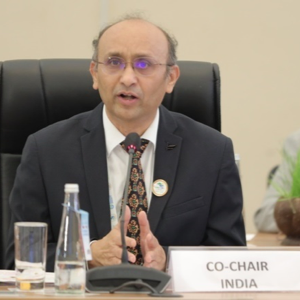

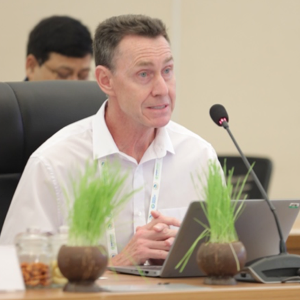
Dr. Gokhale welomed participants and described how India’s Department of Biotechnology (DBT) in the Ministry of Science and Technology (MoST) actively promotes R&D in bio-based products to de-carbonise hard-to-abate sectors like aviation, marine transport, and chemical industries. To support local economies and de-carbonization of India’s aviation sector, DBT has invited R&D proposals for Sustainable Aviation Fuel (SAF) to foster the technological innovations needed to produce advanced low carbon aviation fuel.
Ambassador do Lago described Brazil’s long-standing commitment to using sustainable biofuels to reduce dependence on fossil fuels. These historic trends have been complemented by recent policy developments including the Renovabio National Biofuels Program that incentivizes fuels based on their ability to reduce GHG emissions and the Future Fuel program that will increase ethanol use and begin blending of Sustainable Aviation Fuel (SAF). Ambassador do Lago stressed the importance of transparent sustainability standards for bio-based fuels, chemicals, and materials.
Mr. Jim Spaeth, Chair, Clean Energy Ministerial Biofuture Platform Initiative and Program Manager, Bioenergy Technologies Office, US Department of Energy, began the broader conversation by making the Lead Intervention. Mr. Spaeth introduced the work of the CEM Biofuture Platform Initiative and the efforts that the Initiative and its Campaign are making to increase confidence in the availability and sustainability of biomass feedstocks.
Mr. Spaeth also explained the need for a collective focus in areas such as biomass feedstock diversification, supply chain expansion, sustainability convergence, accurate carbon accounting, technology development, policy support and financial investment.
And that these developments are absolutely critical to the continued and accelerated growth of biomass in its various forms and end uses, and to enable achievement of our collective Net Zero Ambitions of 2050 and beyond.
Key Panellists included Heads of Delegation from Korea, Italy, Netherlands and a Senior National Delegate from India’s Ministry of Petroleum and Natural Gas, and Senior Delegates from Engineers India Ltd., International Energy Agency, Futuria, and LanzaTech.
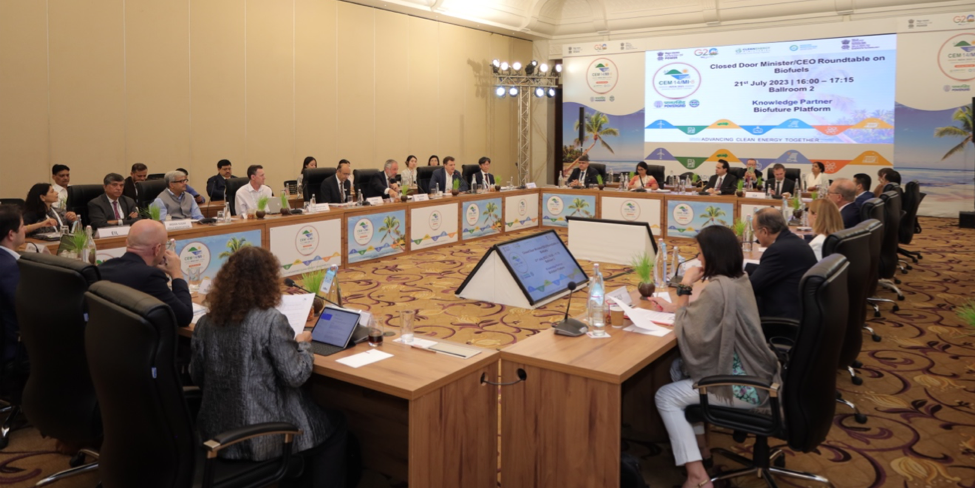
The Key Panellists stressed the following
- The world must rapidly increase the use of sustainable biogenic carbon to replace fossil carbon across a range of economic sectors and technologies.
- Biofuels are important for energy security in addition to mitigating climate change.
- Biofuels can enable an Energy Transition that is both pragmatic and ambitious.
- It is essential to reduce the costs of biofuel production by investing in innovation.
- It is essential that biofuels are produced in a sustainable way and that they complement food production.
- Bio-based chemicals and materials are needed to realize the Net-Zero Circular Economy, and consideration should be given to consider the best use of finite biomass resources.
Subsequently, Panellists leading the growth of the global bio-based circular economy described their progress and the obstacles that they are working to overcome. Panellists represented national agencies, technology providers, feedstock providers, project developers, original equipment manufacturers, and industry associations, including co-chairs of the MI Integrated Biorefineries Mission, World Biogas Association, Brazilian Sugarcane Industry and Bioenergy Association (UNICA), Indian Sugar Mills Association (ISMA), Praj Technologies Ltd., Gevo, Anaergia, Drax, International Transport Forum (ITF), Punjab Renewable Energy Systems Pvt. Ltd. (PRESPL), Topsoe, and Toyota Kirloskar Motors.
The Panellists reiterated the issues raised by the Key Panellists, and added the following
- Policy innovation is needed. Policies need to evolve away from setting simple volumetric targets and instead focus on goals such as reducing carbon intensity of hard-to-abate sectors, rural economic development, and energy security by taking a performance-based approach.
- It is necessary and possible to increase productivity from the land to bring more sustainable biomass feedstocks to market. We are entering a new era of on-farm data acquisition that can greatly empower sustainability monitoring, reporting, and verification (MRV).
- The use of biogenic carbon can be coupled to Carbon Capture Use and Storage to produce carbon neutral fuels, chemicals and materials.
- Abundant carbon rich streams are under-used today, including organic wastes, agricultural crops and residues, and industrial waste streams.
- The use of carbon intensity metrics to drive policy are increasing in an uncoordinated way, which is creating bureaucratic hurdles for companies looking to produce and market the products that will help countries to meet their national climate change mitigation goals.
- Panellists strongly encouraged international bodies, such as the Clean Energy Ministerial and Mission Innovation, to bring together governments and international technical agencies to harmonize national and sub-national policies whose aim is to reduce the carbon intensity of transportation and heavy industries.
Co-Chairs and Lead Intervention
- Co-Chair: Shri Rajesh Gokhale, Secretary, Department of Biotechnology, Government of India
- Co-Chair: Ambassador Andre Corrêa do Lago, Secretary for Climate, Energy and Environment at the Ministry of Foreign Relations, Government of Brazil
- Lead Intervention: Dr. Jim Spaeth, Chair, Clean Energy Ministerial Bio-future Initiative and Program Manager, Bioenergy Technologies Office, US Department of Energy
Key Panellists:
- Mr. Il Leung Kim, Hon’ble Minister for Embassy of the Republic of Korea
- H.E. Vannia Gava, Hon’ble Vice Minister of Environment and Energy Safety, Government of Italy
- Mr. Sandor Gaastra, Vice Minister, Ministry of Economic Affairs and Climate Policy, Government of Netherlands
- Mr. Sunil Kumar, Joint Secretary, Ministry of Petroleum and Natural Gas, Government of India
- Ms. Vartika Shukla, Chairman and Managing Director, EIL
- Dr. Paolo Frankl, Head of Renewable Energy Division, International Energy Agency
- Ms. Rebecca Groen, Chief Executive Officer, Futuria
- Ms. Jennifer Holmgren, Chief Executive Officer, LanzaTech
Panellists:
- Dr Sangita Kasture, Co-Lead, MI Integrated Biorefineries Mission & Scientist/Head, Energy and Environment Biotechnology, Department of Biotechnology, Ministry of Science and Technology, India
- Dr Kees Kwant, Co-Lead, MI Integrated Biorefineries Mission & Senior Expert Bioenergy and Liaison Biobased Economy
- Ms. Charlotte Morton, Chief Executive Officer, World Biogas Association
- Mr. Evandro Gussi, President and CEO, UNICA
- Mr. Subhash Kumar, President, Indian Sugar Mills Association
- Mr. Shishir Joshipura, CEO and Managing Director, Praj Technologies Ltd
- Mr. Patrick Gruber, CEO, Gevo
- Mr. Kunal Shah, Chief Growth Officer & Managing Director – Sales, Asia, Anaergia
- Mr. Mariano Ruiz, Vice President of International Affairs, Drax
- Dr. Jari Kauppila, Head of Secretary-General’s Office, International Transport Forum
- Lt. Col. Monish Ahuja, Chairman & Managing Director, PRESPL
- Mr. Alok Verma, Managing Director for Asia-Pacific, Topsoe
- Mr. Vikram Gulati, Country Head & Senior Vice President, Toyota Kirloskar Motors
Knowledge Partner Representative:
- Dr. Gerard J. Ostheimer | Manager, Clean Energy Ministerial Biofuture Campaign

